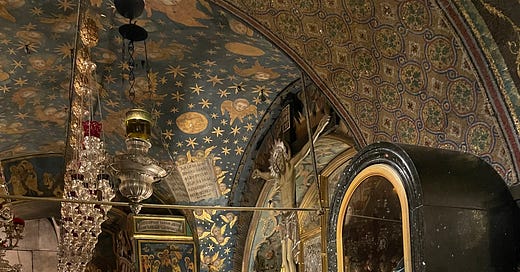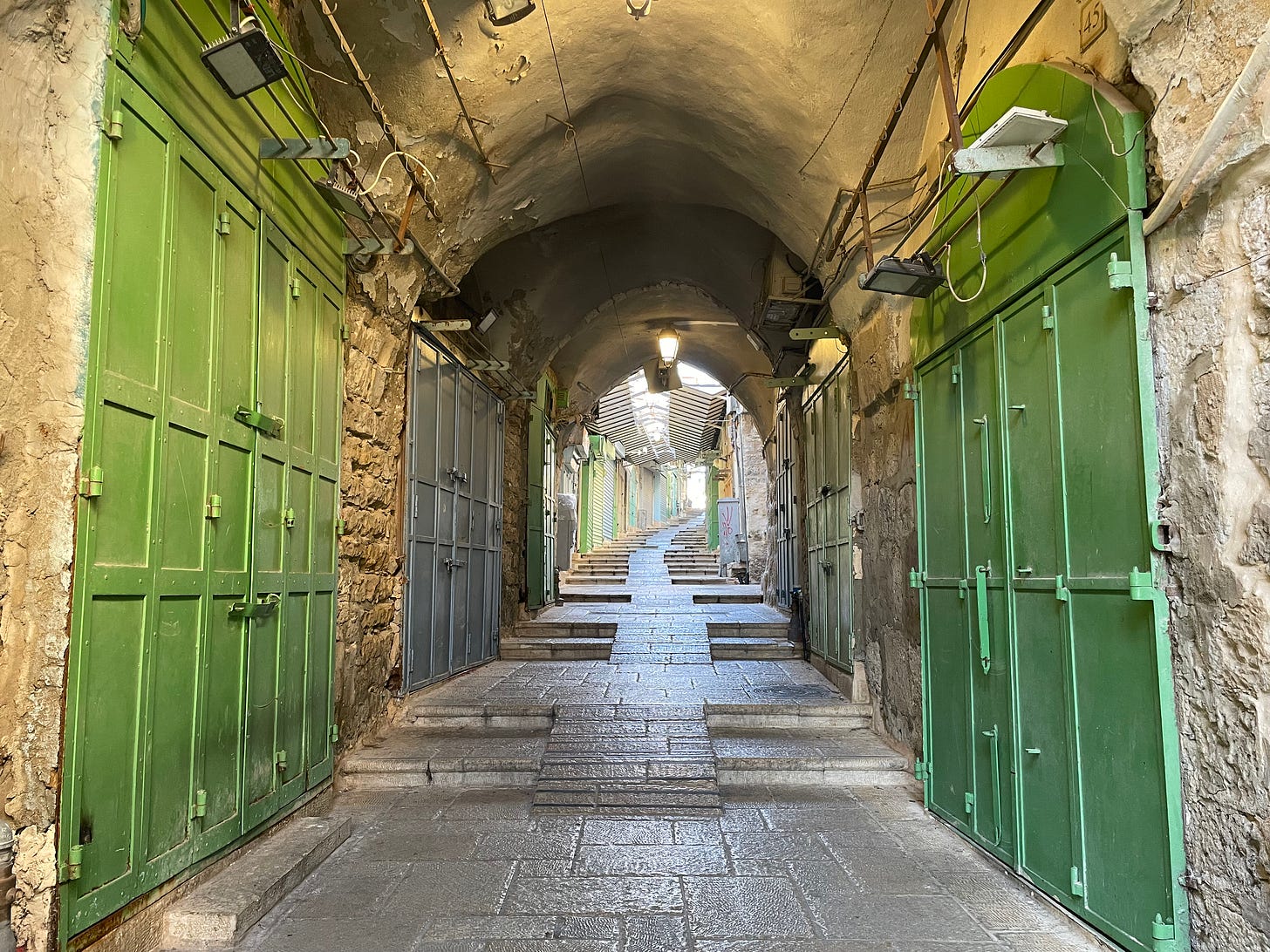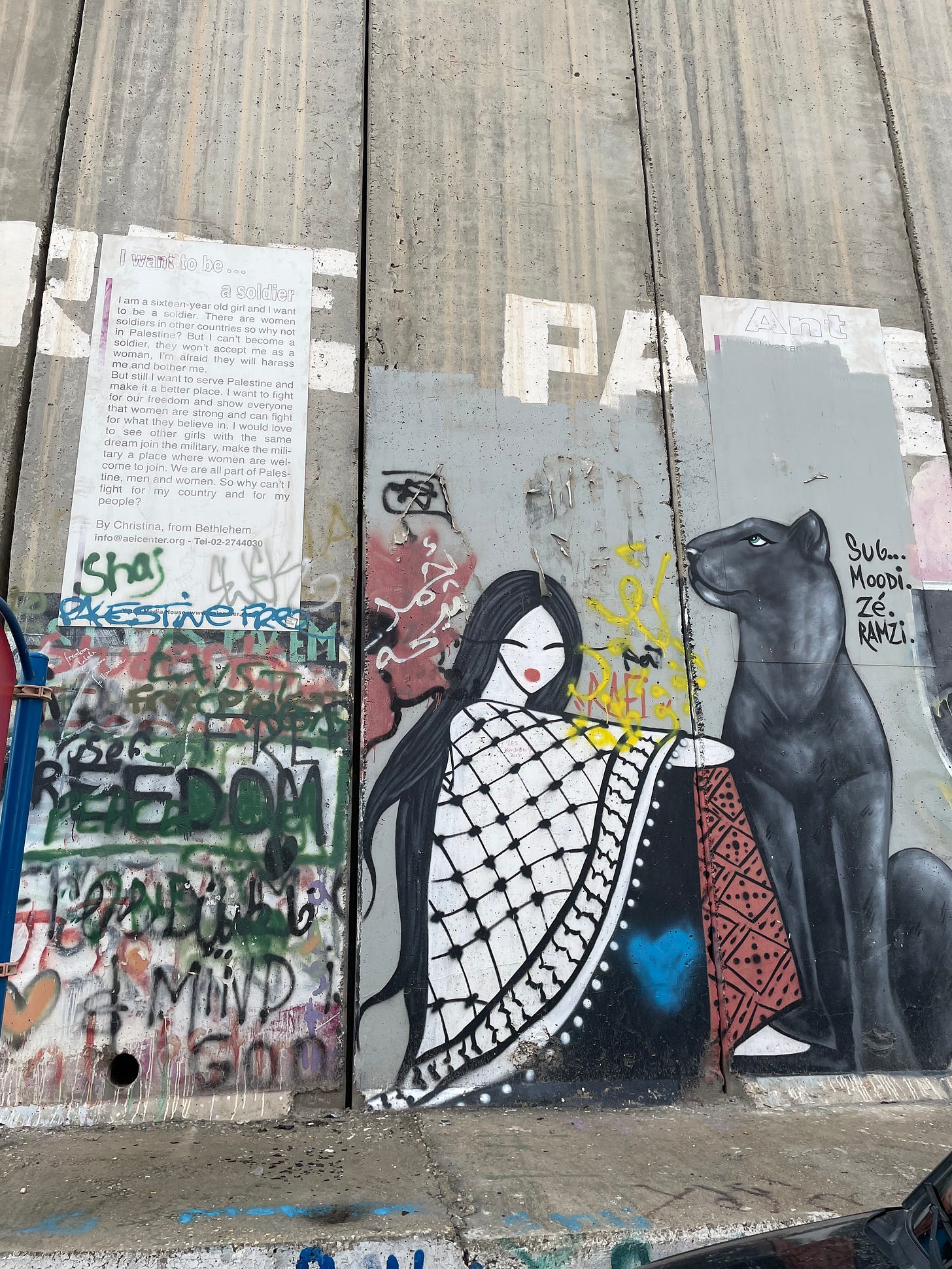UNRWA / The holy city of surveillance and informants
Hello from Jerusalem’s old city,
Many of you will have heard that several EU countries have suspended funding to UNRWA, the main UN agency delivering aid to Palestinians following evidence that Israel provides regarding 12 employees. The evidence was serious enough for UNRWA’s head to terminate the contracts of the employees while an investigation takes places.
The decision of several Western countries to suspend funding (not Ireland or Norway) jeopardises UNRWA’s ability to deliver aid during the humanitarian crisis in Gaza. Israel has a longstanding aim of dismantling UNRWA which exists to provide services to Palestinian refugees until “a just and durable solution to their plight is found.”
I did a radio report about how Israel had targeted UNRWA on the Nakba anniversary in May 2022. You can listen here - the report starts around 6.30 min or read below.
Another radio report I did on surveillance and paranoia in Jerusalem’s old city was broadcast on RTE Radio 1 this morning. You can listen back on RTE playback or read below.
Some pieces that are worth your time:
Following National Holocaust Memorial Day yesterday, I would recommend watching any of Claude Lanzmann’s Shoah documentary that he spent 11 years working on.
A story of survival: 13-year-old takes care of seven siblings amid the war in Gaza by NBC
RTE World Report | Surveillance and paranoia in the old city of Jerusalem
After thudding down a dozen stone steps and through the arch of Damascus Gate, the Muslim quarter of Jerusalem’s old city reveals itself. Fresh bread, sweets, raw meat, leather, soap, incense, and burning oil - all these smells waft from the narrow cobbled streets and winding alleyways.
The wheels of small motorised carts and electric scooters zip over centuries-old pathways and by some of the holiest sites in Christianity, Islam and Judaism. This is where where Jesus and the prophets Abraham, David and Solomon once lived. While the holy city was linked with Mecca by the Night Journey of the prophet Muhammad, whose cousin Ibn Abbas said: “There is not an inch in Jerusalem where a prophet has not prayed or an angel has not stood.”
While angels may still be standing watch today, they could well be outnumbered by the 400 CCTV cameras that have been installed by Israel to watch over local residents. Today, the majority of the 35,000 people living within the city’s walls are Palestinian, living below the poverty line and under 30.
Despite the youthful population, this is no place for young men and boys if they’re Palestinian. As I walk by the end of the Via Dolorosa - the route where Jesus is said to have carried his cross to Calvary - I pass by a dozen Israeli soldiers crowded around a Palestinian teenager being body searched searched against a wall. A soldier - probably 19 or 20 years old - kicks the boy’s leg wider. Another soldier notices me watching. She walks towards me and screams “Where are you from?
Jerusalem is ethnically diverse and Jerusalamites, often ethnically ambiguous. It’s not always clear who is Israeli, Palestinian, Christian, Muslim or Jewish. So it’s not uncommon for a someone in the old city to ask a stranger a probing question - like where are you from - to see if they’ve found an appropriate recipient for their prejudice or favour.
Sadly, sometimes, a uniform, a hijab or a kippah is the only cue an assailant needs to make a deadly attack on another. A soldier checked my bag one morning before I walked through Herod’s Gate. An hour before a 16-year-old boy from East Jerusalem stabbed a police officer there in the neck. The boy was shot dead moments later while the woman died in hospital shortly after. Itamar Ben-Gvir - Israel’s Far-right National Security Minister - soon arrived on the scene and said the authorities were working to demolish the boy’s family home as soon as possible.
At a nearby cafe the owner served fresh pomegranate juice and sighed talking about the attacks. He spoke as someone both used to them and who expects them to happen again - “It’s a pressure cooker here.”
In theory, the old city should be a web of closely-knit communities but instead, an air of paranoia and suspicion often reigns. One Jerusalimite described his home as a city of “spies and torture.” As I sit outside a cafe at the New Gate entrance that leads to the Christian quarter, an acquaintance points at a man walking by. He’s a Palestinian who works for the Shin Bet - the Israeli secret police. “He carries two pistols on him at all times,” the acquaintance says knowingly.
The Israeli authorities have a web of informants among Palestinians and the old city’s residents. Some were arrested and offered less jail time, others a business permit or money, or some simply the chance to stay living in their home city. Palestinians living in Jerusalem are residents, not Israeli citizens - and their permission to live there can be all too easily rescinded.
In recent years, the holy city has become notorious for murky property deals and court cases that are slowly eroding the character of Jerusalem’s distinctive neighbourhoods as Israeli settlers seeks to evict or buy homes from Christian and Muslim residents. Some of these residents are willing to enter into lucrative deals as a way out of poverty; some are tricked into selling to settlers who use murky corporate structures and frontmen to hide their true identities and intentions. While some of Jerusalem’s religious leaders have also been all too willing to sideline their congregations for a healthy return on church property that’s caught the interest of radical Israeli settlers.
Shortly after Christmas, a group of Armenian priests and local residents found themselves fighting off 30 extremist settlers - who dressed in ski masks and armed with various weapons were trying to intimidate the Armenian Christians from their land - which seems anything but holy now.
RTE World Report | Defunding Palestinian rights
May is the month where Palestinians remember Al Nakba, an Arabic term for “the catastrophe”. Al Nakba refers to the forced expulsion of Palestinians from their homes during Israel’s war of independence at the end of the 1940s. Thousands were killed and whole villages were scattered across Gaza and the West Bank, as well as in neighbouring Lebanon, Syria, and Jordan.
Hundreds of thousands of Palestinians, many who had once fished in the sea around Haifa and farmed land around Nazareth, moved into camps established by UNRWA, the UN agency that was given a mandate to look after Palestinian refugees and preserve their right of return.
Today, UNRWA provides healthcare, education and other services to 5.7 million Palestinians across the Middle East. Over 2 million are in Jordan. Most have now been granted citizenship, except for 140,000 refugees who went first to Gaza in 1948 before fleeing to Jordan in 1967. This group are denied basic services from the Jordanian government and rely solely on UNRWA.
Before the Syrian war erupted in 2011, over half-a-million Palestinian refugees lived in Syria. Around a fifth of these refugees have left the country since the conflict began, with many moving to UNRWA camps in neighbouring countries.
Lebanon initially welcomed the Palestinians who fled there after Al Nakba. In the 1950s, the government of Camile Chamoun offered citizenship to mostly educated Christian Palestinians, as well as wealthy Muslim Palestinians.
Since then and the civil war which raged through Lebanon from 1975-1990, the country has become a much more hostile place for Palestinians.
Today, laws reinforce segregation between Palestinian camps and the rest of Lebanese society. Since 2001, Palestinians have been barred from owning property in Lebanon which means they have few opportunities to leave the overcrowded refugees camps, where they are forced to go through checkpoints whenever they leave and enter.
Repairs and construction in the camps are slow, as Palestinians require the consent of the Lebanese Army for any building work, no matter how small. Palestinians are also barred from working in most professions in Lebanon. They can study medicine or engineering or law, but they will ever be able to properly become lawyers or engineers or doctors.
They are often limited to working for UNRWA itself or else they must partner with Lebanese professionals who can sign their paperwork. A Palestinian doctor born in Lebanon to Palestinian parents, for example, can legally only work as an assistant for a Lebanese doctor.
The job restrictions have kept Palestinians families in a cycle of poverty, with few opportunities to improve their circumstances in Lebanon.
Without job opportunities to support themselves in Lebanon, Palestinians are heavily reliant on the overstretched UNRWA for basic services. The resources available to the UN agency have stagnated over the last decade, while the needs of Palestine refugees have kept increasing.
Overcrowded camps in Lebanon such as Sabra and Shatila in Beirut have had to contend with a new influx of Palestinian refugees from Syria over the last decade.
During the Trump administration which aligned itself closely with Israel, US funding for UNRWA effectively ceased. Jared Kushner, Trump’s advisor and son-in-law also lobbied Jordan to remove the refugee status of Palestinians living there. It would, of course, be convenient for Israel if Palestinian refugees simply became Jordanians instead.
While the Biden administration has reinstated US funding for the beleaguered UN agency, it has not returned to pre-Trump levels.
Last month, the head of UNRWA proposed that due to the scale of the funding crisis and a “clear de-prioritization of the Palestinian issue” that some services would be delegated to other UN agencies.
Samer Sinijlawi an expert on Palestinian humanitarian affairs, says that this proposal is intended to test the waters ahead of a UN vote on renewing UNRWA's mandate next year.
He says that it also gives a green light to countries that have been trying to manipulate this mandate and gradually end the work of UNRW.
Israel has long campaigned for the UN agency for Palestinians be disbanded and for other UN agencies to deliver services instead.
This is because UNRWA is not just a humanitarian organisation; it’s a political statement and a reminder that the international community, which facilitated and stood by as Al-Nakba happened, has a responsibility to solve this generational catastrophe for the Palestinian people.






